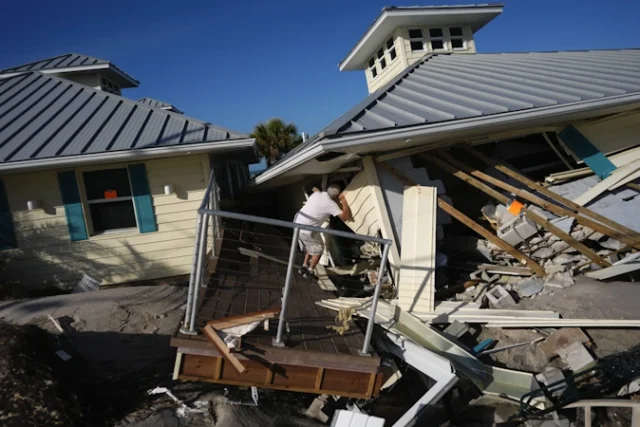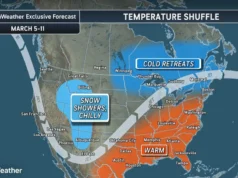
BY ISABELLA O’MALLEY AND MARY KATHERINE WILDEMAN
The 2024 Atlantic hurricane season comes to a close Saturday, bringing to an end a season that saw 11 hurricanes compared to the average seven, and death and destruction hundreds of miles from where storms came ashore on the U.S. Gulf Coast.
Meteorologists called it a “ crazy busy ” season, due in part to unusually warm ocean temperatures. Eight hurricanes made landfall, in the U.S., Bermuda, Cuba, the Dominican Republic and Grenada.
Hurricane Beryl became the first Category 4 hurricane on record to form in the month of June, slamming into the island of Carriacou in Grenada. In Jamaica it went on to destroy crops and houses and left two dead. The last time the island was scraped by a Category 4 hurricane was Dean in 2007, making it “pretty rare,” said Brian McNoldy, a hurricane researcher at the University of Miami. The storm then intensified into the earliest Category 5 hurricane ever in the Atlantic on July 1. Major hurricanes — Category 3 and above — are not usually seen until September 1, according to the National Hurricane Center.
In September, Hurricane Helene caused catastrophic damage across the southeastern U.S. and was the deadliest storm to hit the U.S. mainland since Katrina in 2005. More than 200 people died. North Carolina estimates the storm caused at least $48.8 billion in direct or indirect damages with houses, drinking water systems and farms and forests destroyed. Florida, Georgia, South Carolina, Tennessee and Virginia also sustained extensive damage.
In October, Hurricane Milton rapidly intensified and the storm’s maximum wind speeds hit a screaming 180 mph, making it one of the strongest hurricanes by wind speed ever recorded in the Gulf of Mexico. The only one stronger by that measure was Hurricane Rita in 2005.
Hurricane season and climate change
Planet-warming gases like carbon dioxide and methane released by transportation and industry are causing oceans to rapidly warm. Several factors contribute to the formation of hurricanes, but unusually warm oceans allow hurricanes to form and intensify in places and times we don’t normally anticipate, McNoldy said.
“In other words, we never had a storm as strong as Beryl so early in the season anywhere in the Atlantic and we never had a storm as strong as Milton so late in the season in the Gulf of Mexico,” he said.
“I don’t ever point to climate change as causing a specific weather event, but it certainly has its finger on the scale and makes these extreme storms more likely to occur,” said McNoldy.
Disclaimer
Artificial Intelligence Disclosure & Legal Disclaimer
AI Content Policy.
To provide our readers with timely and comprehensive coverage, South Florida Reporter uses artificial intelligence (AI) to assist in producing certain articles and visual content.
Articles: AI may be used to assist in research, structural drafting, or data analysis. All AI-assisted text is reviewed and edited by our team to ensure accuracy and adherence to our editorial standards.
Images: Any imagery generated or significantly altered by AI is clearly marked with a disclaimer or watermark to distinguish it from traditional photography or editorial illustrations.
General Disclaimer
The information contained in South Florida Reporter is for general information purposes only.
South Florida Reporter assumes no responsibility for errors or omissions in the contents of the Service. In no event shall South Florida Reporter be liable for any special, direct, indirect, consequential, or incidental damages or any damages whatsoever, whether in an action of contract, negligence or other tort, arising out of or in connection with the use of the Service or the contents of the Service.
The Company reserves the right to make additions, deletions, or modifications to the contents of the Service at any time without prior notice. The Company does not warrant that the Service is free of viruses or other harmful components.












